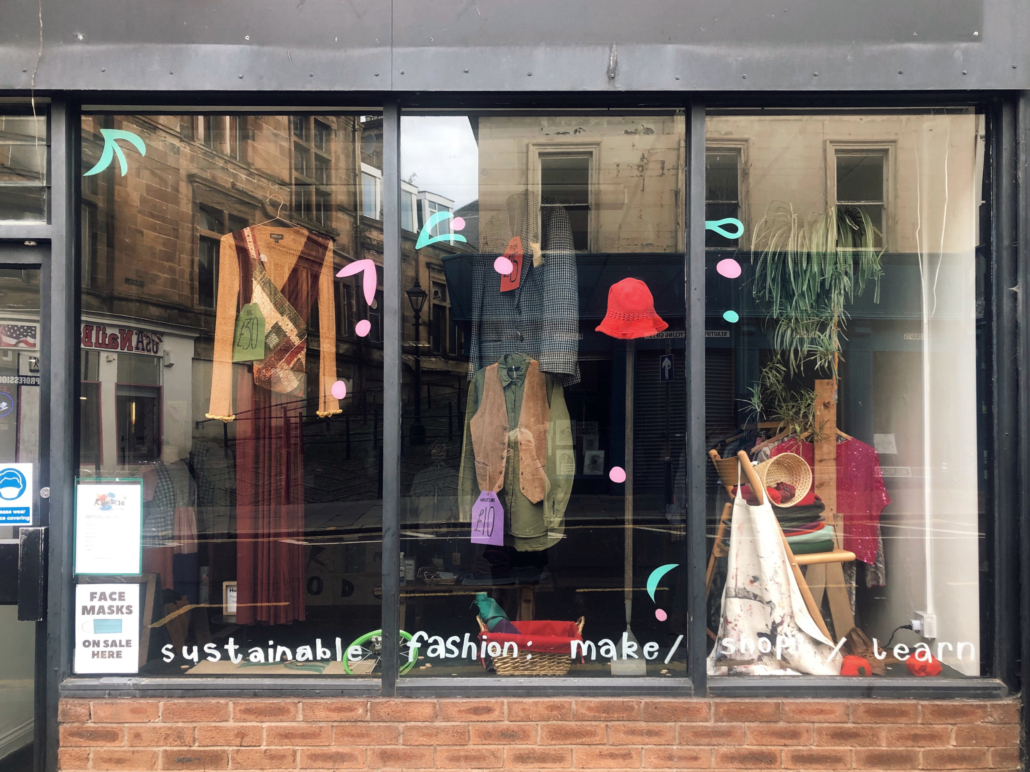Having had a look in ReMode’s Paisley shop a few times, I was keen to learn more about all that goes on there. Passing by, ReMode catches your eye with their vintage and handmade clothes created by volunteers, but they are much more than just a shop. I spoke with Gillian Steel, Creative Director of ReMode, about what they get up to as an organisation, as well as their wider message of sustainability and recognising your own agency to act upon climate breakdown.
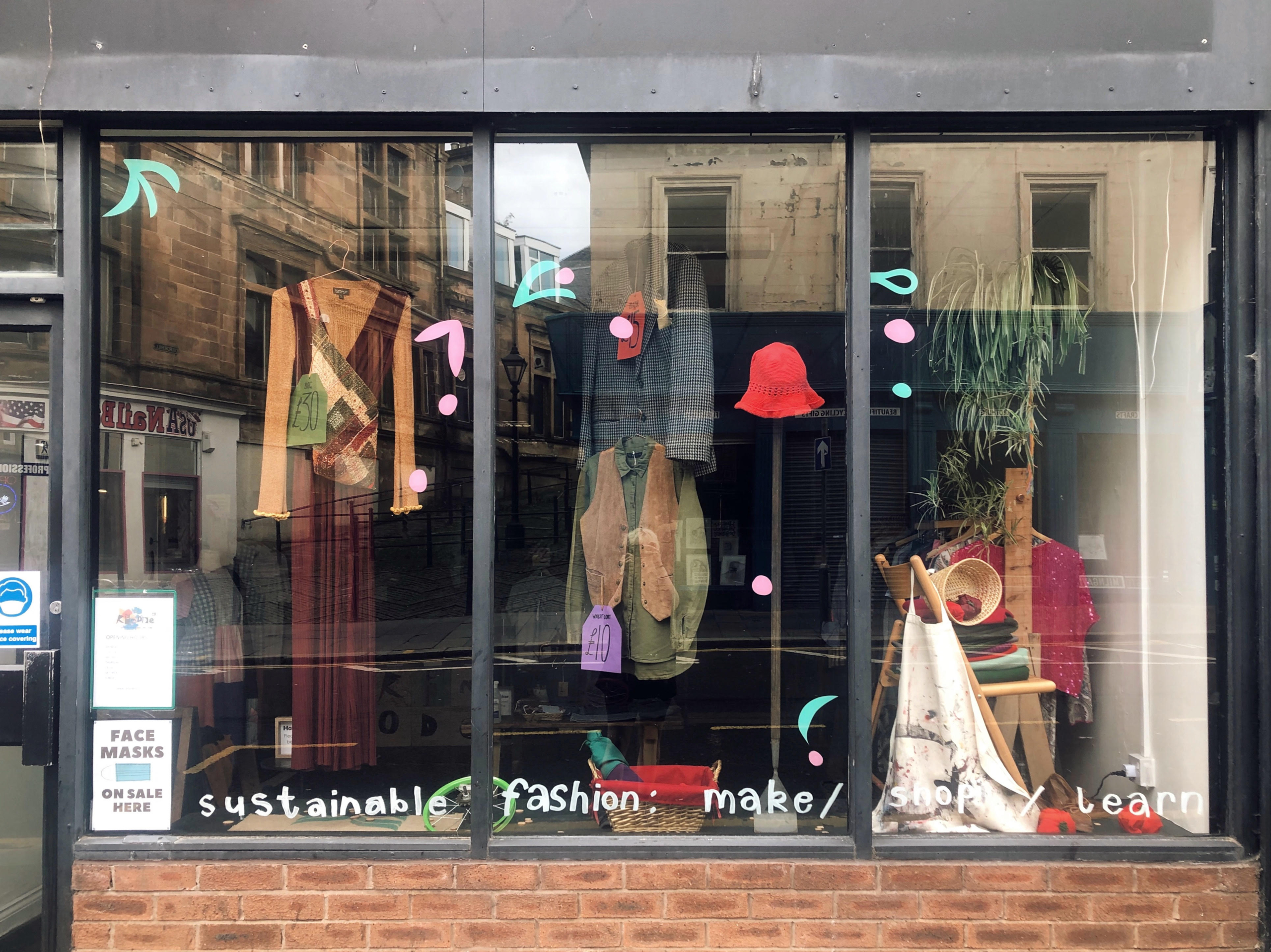
Firstly could you tell us a bit about ReMode in general for those who don’t know much about it, and what the main idea behind it is?
So, ReMode is a Climate Challenge funded project and it started about six years ago as an education programme for young people, 11 to 18 years of age, but it has evolved over that time. After the first year-and-a-half or so, we got a shop in the village in Lochwinnoch, and the idea behind the shop was that the volunteers and the participants of the workshops made the clothes, or adapted them, or mended them, therefore learning these skills to do them to their own clothes, providing some of the stock for the shop and the stock was then sold on a tokens basis.
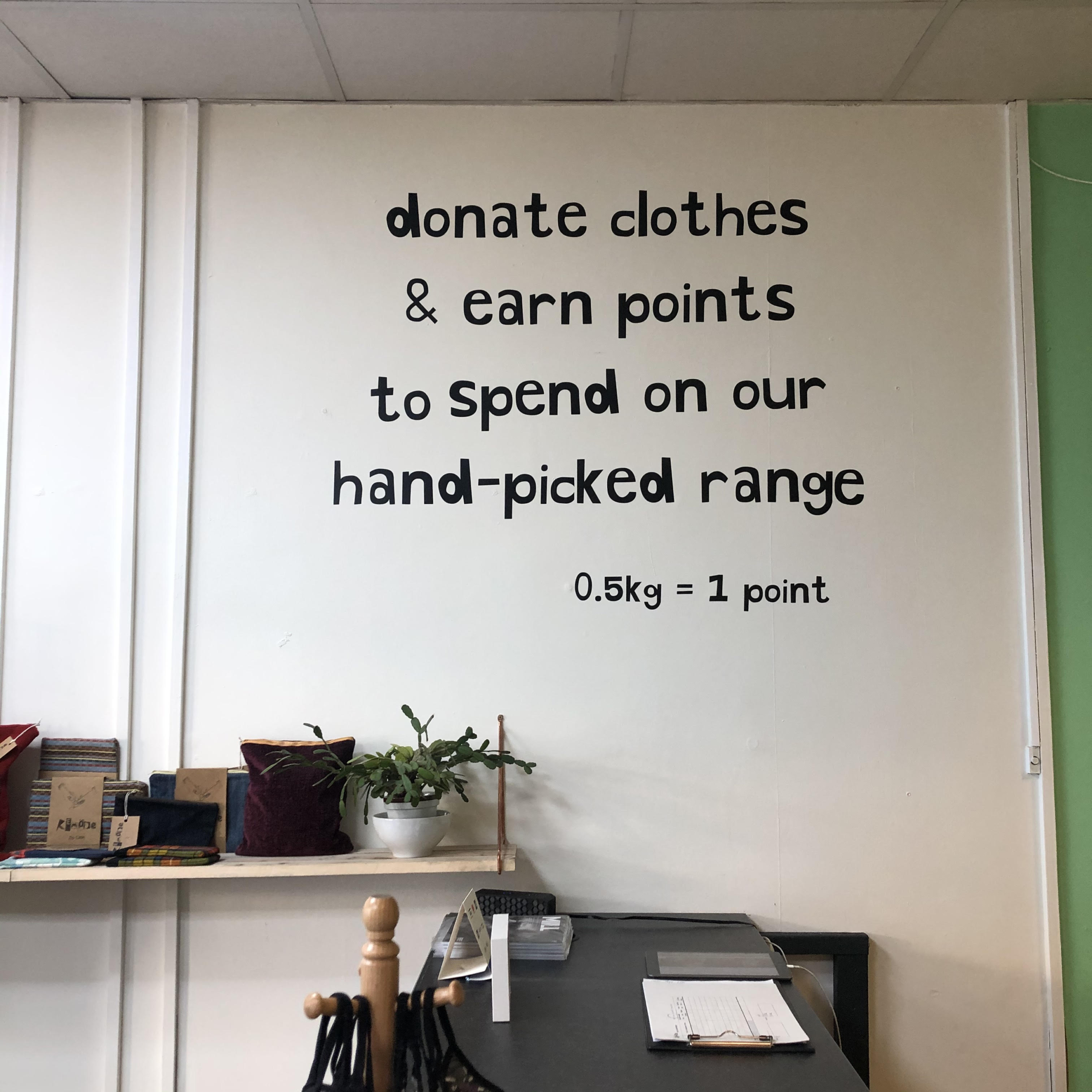
So that was the general idea, the space in Lochwinnoch is now a Make Space, and we now have a shop in Paisley which has been much more successful in terms of attracting that age group from about 16/17 years until mid to late 20s, which we’re really happy about as that’s really the group of people we want to engage. We have studios at the back of our shop in Paisley, where we have two artists at the moment who are working in there. They are designer/makers with similar ethics around about sustainability and that practice. We usually run a programme of workshops, where people come in, for example, on a Friday evening when we have ReCycle or Dye, which is for 11 to 18 year olds. They can learn all these different skills to make things from patterns or from scratch, using a drape approach. We also work with other groups, such as a boys’ group called the Yang collective who were making shirts. So we’ve got loads of stuff going on; we’re not really just a shop. The shop is a front-facing device to get people engaged and to get them to come in and start a conversation around climate breakdown, and get people to understand how powerful they are, what agency they have in helping to address the issues around climate breakdown.
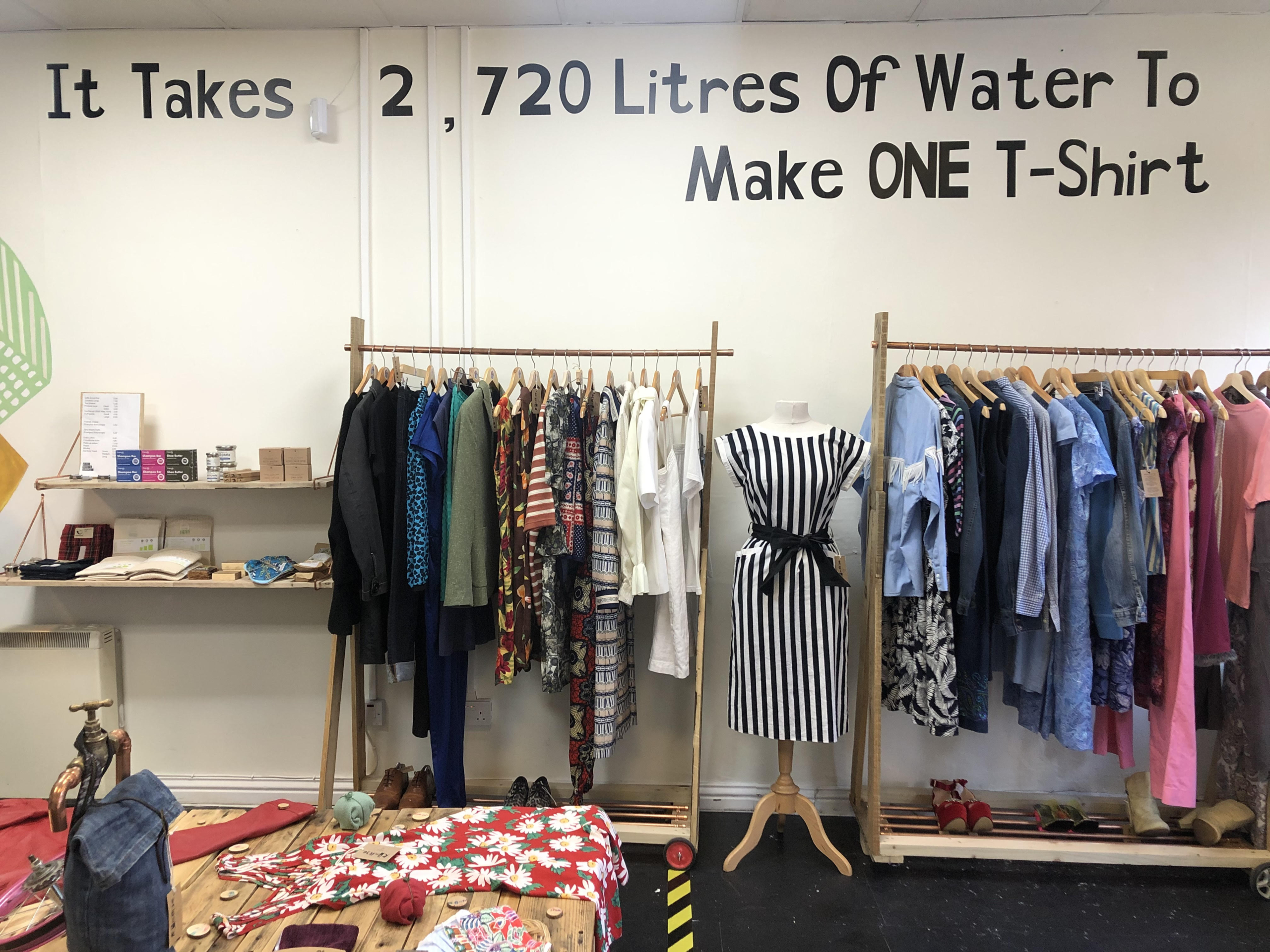
Can you tell me a bit about the token scheme?
So, when people came in and donated clothing, for example, a couple of pairs of jeans and a few tops, there might be three kilograms of weight in that donation and then they would be awarded three points and they could spend that on the rails. We now have a kind of hybrid system where you can accrue points by bringing in donations, to get points for nothing really, from all the clothes that you don’t want anymore, and we process all that clothing. We cherrypick vintage stuff, we look for special materials like silk, cotton, leather, wool and direct that towards various parts of the workshop programme. That means that those workshops always have free materials to work with and we don’t buy anything new. The hybrid system means that you can now have those points that you gain by donating, but you can also use pound sterling, because we received feedback that people wanted to be able to use pound sterling. For example, if a top costs five tokens or £5, and you have three tokens in your account, then you can use three tokens and put £2 out of your purse, towards it.
So clearly there’s a big focus on sustainability, is this something you see as being on the rise in Paisley? Do you think it still has a long way to go?
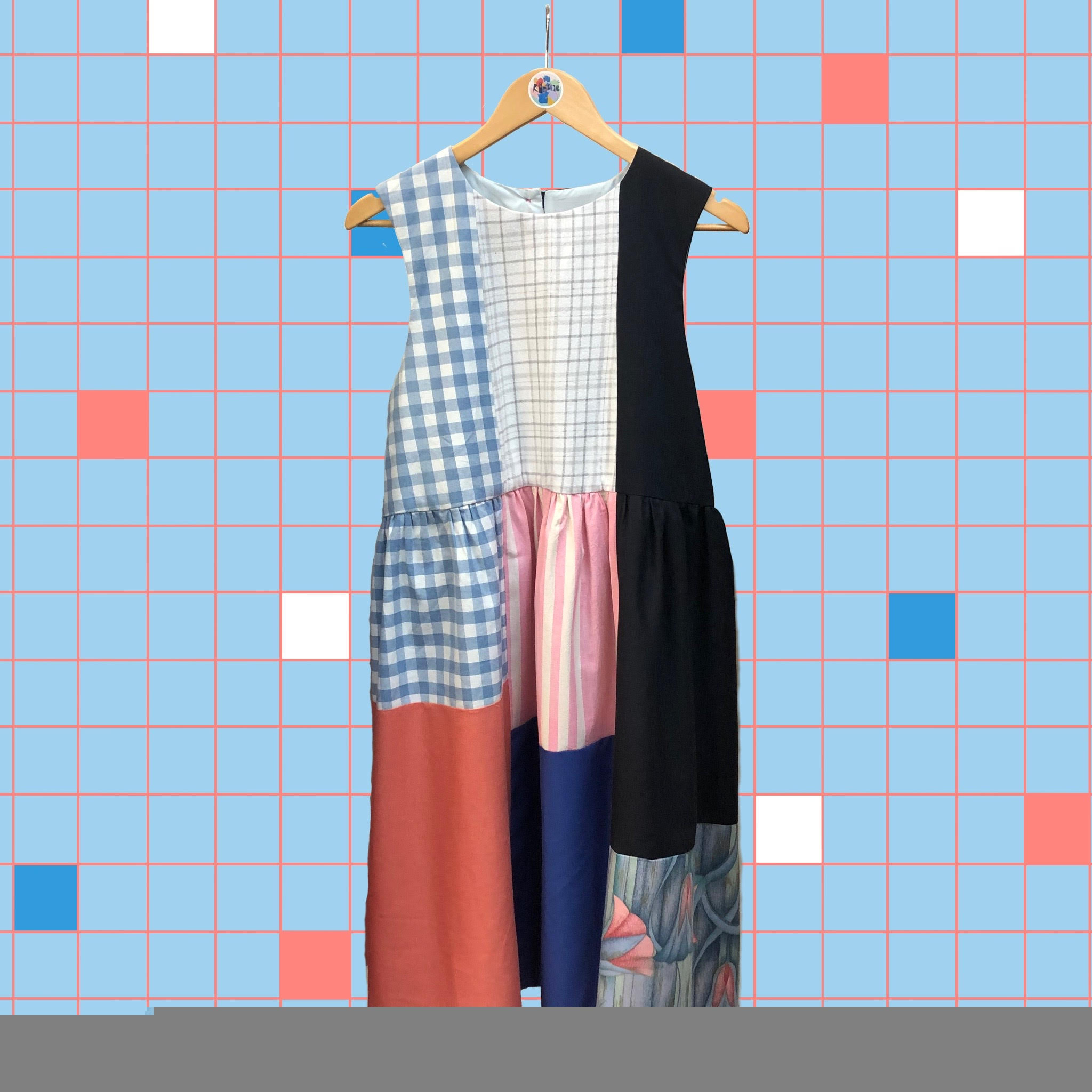
Well, sustainability is not the main message, it is the message. We cannot sustain the way that we use natural resources to make our clothing, whether we’re in Paisley, or Malawi or anywhere on this planet. We cannot possibly sustain the amount of virgin materials we are using to make new clothes currently, we can’t keep doing that. Sustainability is the message.
In Paisley, we are kind of building up more of an awareness of it. Yeah, people are becoming a bit more aware, but it is still kind of a peripheral thing. Really what we should be talking about is: clothing is the practice of growing fibres, gathering fibres, harvesting, making clothes, manufacturing clothes. This should all be a sustainable practice, but it isn’t at the moment, so we’re at the very thin end of the wedge and we’re still at that point where people see it as being kind of a niche area. That’s a really foolish way to look at it because it has to be the central focus, that’s how we have to practice that, not just in terms of our clothing, but also in terms of our food, our transport, all these central ways of living. It all has to be sustainable.
In terms of whether that’s a new message in Paisley, there are sections of the population who are already quite acclimatised to the idea of: ‘No I don’t buy new, that’s just the way that I am. I go and look for something second-hand, or something that’s been handmade that I can afford, and then if I really don’t find that there then I’ll buy new if I really have to.’ But that should be the way that we all operate from the outset. And it still tends to be the case that it’s a certain group of people, it’s still perceived as being quite a middle-class way of operating. That isn’t necessarily true, because there are people who are in quite low-income bracket groups, who are living in areas that are considered to be areas of high depravation, who have for decades and decades been operating in this way anyway. They’ve been handing clothes down to neighbours, they’ve been mending stuff, adapting stuff as they needed to. So, although it’s perceived as being a middle-class preserve, it is actually out there anyway. What we need to do is to get that much broader group of people to connect, and to come into the shop and not feel; ‘Oh that’s for those weird middle-class people who wear sandals or eat brown rice or order really expensive organic vegetables.’ This is for everybody. We do try and make the stuff that we have in the shop, the handmade stuff, accessibly priced. And sometimes that means that things are being made a below National Minimum Wage level per hour, because we’re really trying to make sure it is accessible in terms of its price. But it’s done by volunteers which makes that possible. We do accept at the same point that there are still a lot of folk who maybe have three kids, and going to Primark is still the most economical way to go and get school uniforms or summer holiday clothes.
I saw you also have a filmmaking group, and are using that to promote the message of sustainability, so it’s really about trying to get people together and find creative outlets, whilst sticking to the ethical ethos, would you say that’s right?
Oh, yes, yes. I trained as a textile designer and then I trained in television and electronic imaging and animation, so I have both those things in my background, and it made sense to pull that into the operation of the programme and the shop. Quite often what happens is you’ll get a group of people who don’t see themselves or identify as having an interest in clothing; making clothes or mending clothes, they don’t see themselves as a part of that group. So, the film projects and workshops are a way of attracting a different group of people, quite often boys.
For example, we recently had Stop/Start, which was a project that was around lockdown, and looking at the link between the COVID-19 virus and how we are, as a species, not being very kind to our environment. We had a group of young people who came and did raps, wrote poetry, they worked with two musicians, and it was an all male group for the rap music side, and an all female group for the animation side. Through that, we reached a very different audience, and through the process of making the film and the soundtrack, those participants got to understand a lot more about what the problems are; it’s the resources and the amount of resources that we’re expecting from our planet in terms of clothing. So, the filmmaking projects are really important. That’s one side of it, the participation because it engages a different group; the other side of it is that we produce these lovely little short films which we can then send out to lots and lots and of different people at the same time. You have this little compact set of ideas within a short film of maybe two to three minutes, that shows what the problems are.
Has it been difficult adapting to a new way of running the shop and the hub and workshops during the coronavirus pandemic restrictions?
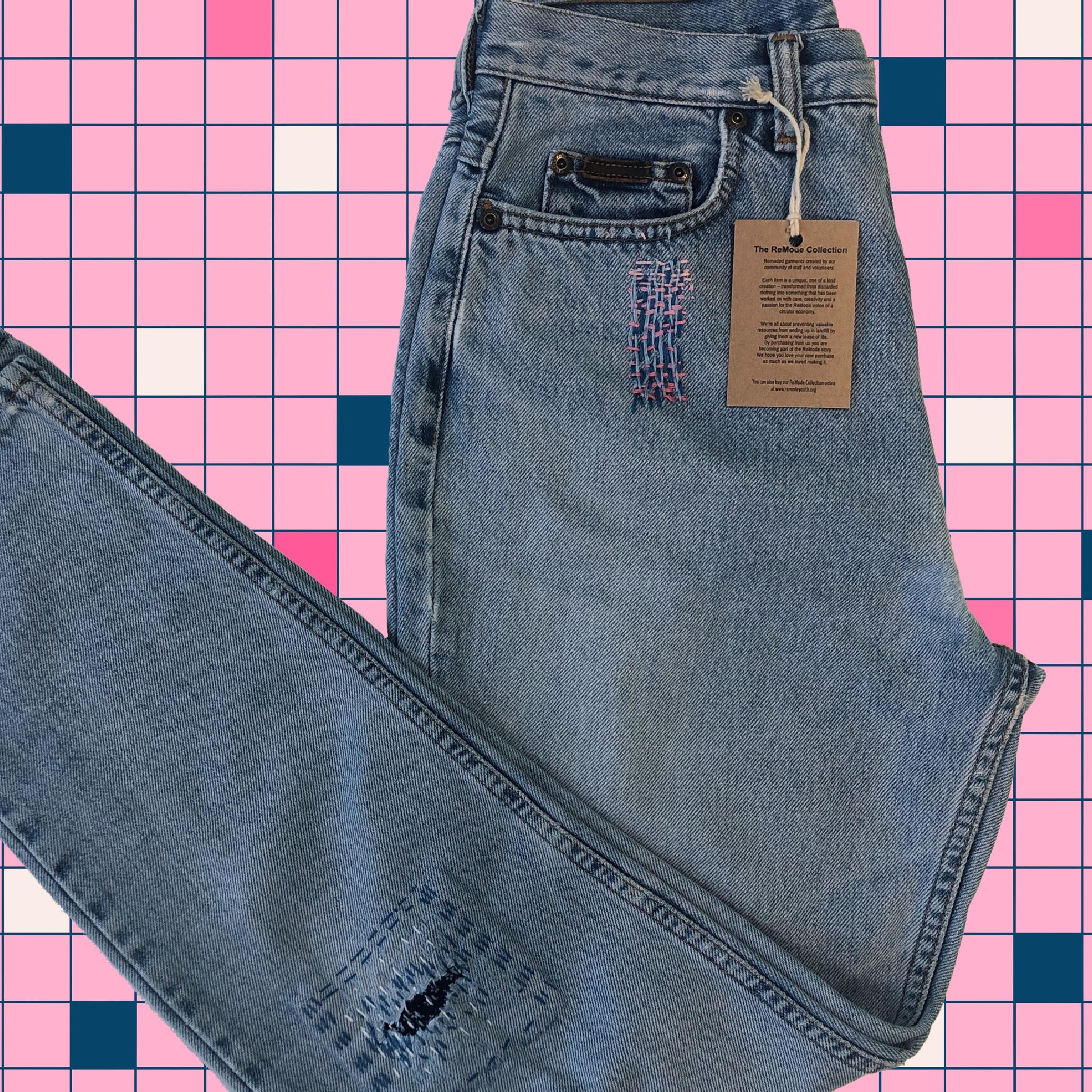
It’s been difficult for everybody in every aspect of our lives! And I think, more than anything, there was a real sense of shock. I think everybody reeled with absolute disbelief that this was an actual thing that was actually impinging on our freedom, on our ability just to do the things that we normally do. I think, from my point of view, that’s been an incredibly positive thing, because two things have come out of it. One is the realisation that this is not just a story that there’s a problem with how human beings relate to their environment, but that it’s a reality that will impinge on our freedom and our ability to live the way that we want to live. So we have to address it. The second thing is that it pushed us as an organisation to be really creative, and look at ways in which we could re-devise the whole programme around social distancing, using online Zoom workshops; that was really hard, and I think we were sometimes quite dispirited. I think a lot of people have experienced low spirits throughout this, because we couldn’t be around each other, to be conversational, laugh about things.
But I think it has been one of the most positive phases of ReMode’s development. What we took from it was: I decided, as the programmer for ReMode, I have to think of this lockdown not just as a one-off, but with the notion that it could happen again. So however we move ahead, we have to be aware that this could happen again, which allows us to address the idea of isolation and remoteness, whether or not there’s a lockdown, and there are people who could take part via Zoom workshops, who couldn’t otherwise. So moving forward, Zoom workshops will be an ongoing part of what we do, and we’ll have to train all the facilitators in being able to communicate the ideas and how you do things step by step, using cameras and by preparing storyboards before the Zoom workshop so that you know exactly what you’re doing with the group.
We’ve also looked at things like bringing out a zine, so we now have a ReMode Zine that we are starting up, which will come out in the next couple of months. Again, people remotely can write articles, or make photo stories of clothing that they’ve bought that they particularly like, that’s second-hand, or that they’ve mended or adapted. They can send all that stuff to us and got a curator who will collate all that stuff to make an eight page zine. That will be printed so people can pick it up when they come into the shop, and it will also be available online. It’s a fantastic way of getting lots of conversations going, which we wouldn’t have come across if this lockdown hadn’t happened.
We’ve also developed the online shop. That does broaden the base that we can reach, but it also creates a problem in that it creates a distance between the person buying the clothes and the actual material substances of the clothes; you can no longer touch it, feel it, try it on. I do think that’s a problem. That’s been part of the problem since the end of the Second World War, where we’ve reached that familiarisation with mass production, so we’re becoming less and less connected to those material substances. We just think of them as: ‘Oh yeah there’s loads of it and it’s there’, which worries me a bit. Moving forward, we have to work on continuing to connect people to those materials especially if we are selling them online. But there has been lots of good that has come out of it.
Who would you encourage to get involved, and how can they do so?
Well, obviously everybody, but our funding and our focus is on young people. Your age group and younger are the people who are going to grow up, get older, want to have kids, want to grow lives, live in different parts of the world and so on. You’re going to face the problems that are being generated right now. So, we want to engage that group of people in the solutions, and there are plenty of solutions. We can resolve this and turn it around. What worries me is that there’s a lot of very negative stuff around it where young people get quite depressed about it, so we want to ensure that we engage an audience of young people, because you’re the people who are going to have to deal with it, and we want them to positively engage with it right now. We want to help to create agile thinkers, people who have the hand craft skills to mend clothes, people who have the mindset to pass on clothes, and accept that as part of life and part of the story of a garment that they enjoy. But of course, we do want to involve everybody ultimately.
There’s lots of ways to get involved. We have a volunteer group, who meet up every Wednesday, and at the moment we have about 25 volunteers, but there’s a core group of about 12-15, who do stuff for us regularly, and they’re all different people with different characteristics. There’s a group of maybe four or five who join in the Zoom on a weekly basis, and they enjoy that environment; they sit doing their mending, they talk about what they’ve been doing during the week. There are others who maybe go and deliver stuff or make up packs of materials. So there’s lots of ways of getting involved just within the volunteer system itself. That could be for people at school age; we can organise volunteering for people at school, through their Duke of Edinburgh award, but also beyond school; someone who wants to build up skills, or an understanding of sustainability and climate breakdown. They can come and work with us and understand more about materials. Or of course if you have a particular interest in clothe making.
We also have our workshop programme which is mainly online at the moment, but we’re hoping that we’ll be able to have small groups together, maybe a group of four participants at any given time; socially distanced and masked up and with a facilitator.
Get in touch with us! Come into the shop. When you come and join our mailing list in the shop we ask a few things about your shopping habits so that we can gain some data to understand how things are changing, but we reward you with five tokens, which equals to £5 in the world of ReMode, which you can spend on our second-hand clothing, vintage rail. Sometimes people come in just to chat, to see what’s going on, and that’s the main thing, it’s those conversations that are really important. So come and have a chat, find out about volunteering, like us on Facebook and Instagram so you can keep an eye on what we’re doing, and please get in touch if you’ve got an idea of something you think we should be doing that we aren’t yet.
Anything else you’d like people to know?
Just that we’re fantastic! I feel incredibly proud of this organisation. I started it on my own, and there was some really difficult stuff at the beginning; forming a community, being on my own and then finding the funding to bring in other people. I’m Creative Director and I have a view of what I want the organisation to do, but what has been amazing is, bringing in other people, like Carolyn, and Emma as members of staff, Jane, who does the very sensible stuff around organising and money, all of that brings in different brains, different characteristics that have made this organisation grow and to change direction. I think that has been incredibly exciting, and I have to take my hat off to their commitment, and also to our incredibly talented volunteers, for the beautiful stuff they make. So come and join us!
You can visit ReMode at 43b High Street, Paisley. They are currently open 10am-4pm Tuesday to Saturday. You can also find them on Instagram: @remode_youth, Twitter: @ReModeIt, Youtube: ReMode It and Facebook: ReMode, as well as their website www.remodeyouth.org
—
Another article from the very talented Rachel Campbell:
“I’m Rachel and I’m a 20-year-old student studying English Literature and History. I’ve always enjoyed writing and after getting involved in the student newspaper during my time at university, I’ve found a real interest in journalism too. I’m looking to write positive stories about what is going on in Paisley, and help readers learn more about the businesses and activities that are so close by. I’m interested in sustainability and how we can support local businesses whilst also doing our bit for the planet. Along the way, I’ll hopefully write about a wide range of topics: music, fashion, theatre, art, health and wellbeing, and anything else that is happening in Paisley. I’d love for anyone to get in touch if they’re interested in having me write an article about their business/charity/event/


